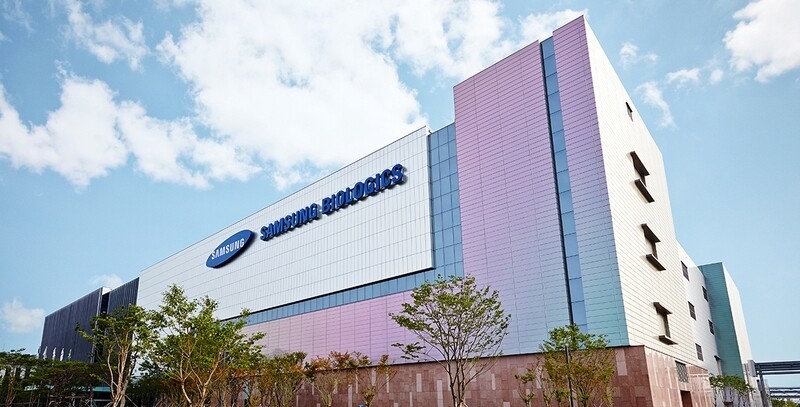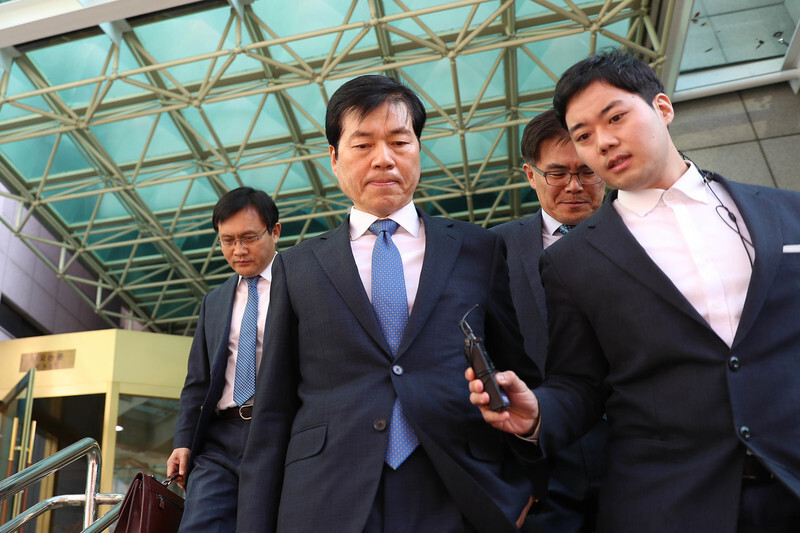hankyoreh
Links to other country sites 다른 나라 사이트 링크
Trade of Samsung BioLogics stock suspended

Trade of Samsung BioLogics (Samsung Bio) stock on the market were summarily suspended on Nov. 14 after financial authorities reached a final conclusion that the company had engaged in “deliberate accounting fraud” in connection with affiliate Samsung Bioepis.
The situation is now seen as increasingly likely to proceed under a three-track approach involving a listing suitability review by the Korea Exchange (KRX), which considers whether to delist companies; an investigation by prosecutors; and a court review in response to an administrative suit filed by Samsung.
KRX immediately suspended trade of Samsung Bio stocks listed on the market on Nov. 14 after the Financial Services Commission’s securities and futures committee, which conducted a second review of the case, decided to rule it a matter of fraudulent accounting and report it to prosecutors. Samsung Bio ranked fifth on the KOSPI market for total capitalization at 22.1322 trillion won (US$19.5 billion) as of Nov. 14.
The rules for stock market listing state that sales transactions are “to be suspended in the event of relevant grounds based on a practical review in terms of delisting standards or listing suitability, from the time that said grounds are confirmed until such time as they are resolved.”
Following the sales suspension, KRX plans to immediately begin listing suitability review procedures for Samsung Bio. According to KRX listing rules, in the event that a company with over 2 trillion won (US$1.77 billion) in total assets (Samsung Bio’s asset total 7.3 trillion won, or US$6.4 billion) is deemed by financial authorities to have violated accounting standards and reported to prosecutors on those grounds, it is subject to delisting review procedures if the amount implicated in accounting violations amounts to 2.5% or more of capital owned by the company (3.77 trillion won/US$3.3 billion in Samsung Bio’s case).
Since the findings of the Securities and Futures Commission’s second audit provide grounds to review whether the company should be listed on the stock exchange, KRX is planning to decide by Nov. 15 whether Samsung BioLogics’ deliberate accounting violations are subject to such a review by the Corporate Evaluation Committee. Moving forward, this committee, which is composed of outside experts, will decide whether or not Samsung BioLogics should be delisted. If such a decision is made, Samsung BioLogics is likely to immediately file an objection. In that case, the Listing Announcement Committee would be convened for a further review to decide whether the company should be delisted or given time to improve its practices. All of these procedures are expected to take around two months.
“We will be giving adequate consideration to the scope and content of the accounting irregularities in determining whether to send this to the Corporate Evaluation Committee for review,” said a senior official at KRX. “If the committee does review this matter, it will also decide whether the company should remain listed after carrying out an in-depth, fact-based review that seriously considers the deliberate nature and scale of the fraudulent accounting and investor protection.”

No precedent of company being delisted for accounting fraud
Considering the size of this stock listing – with a market capitalization of 20 trillion won (US$17.8 billion) and more than 80,000 investors – it’s likely that the idea of delisting the company will spark a debate in the market regardless of the fraudulent accounting. On Wednesday, Samsung BioLogics stock closed the day at 334,500 won (US$296), up 6.7% from the previous day.
That said, there have been no previous examples of a company being delisted from the exchange because of fraudulent accounting. Even in the largest case of fraudulent accounting that has ever come to light – 5.7 trillion won (US$5.05 billion) at Daewoo Shipbuilding and Marine Engineering – trading was suspended for a year and three months, starting in 2016, but the review did not result in the company being delisted from the exchange.
After the Securities and Futures Commission filed a complaint with the prosecutors on Wednesday, the prosecutors’ investigation is expected to begin in earnest. Samsung BioLogics immediately rejected the commission’s findings and promised to “file an administrative lawsuit to prove the legality of its accounting practices.” This raises the possibility that the controversy about whether or not the company’s accounting violations were deliberate could go on for years and eventually reach the Supreme Court.
What the courts are likely to do
In short, the prosecutors and the courts are likely to umpire a sharp dispute over the allegations of deliberate accounting fraud between financial regulators, including the Financial Supervisory Service and the Securities and Futures Commission, and firms associated with Samsung. Those firms including Samjong KPMG and Deloitte Anjin, which were given harsh penalties (fines and suspension of auditing duties) along with Samsung BioLogics after they audited the company’s accounting at its request and the request of the Samsung Group. To be sure, KRX’s decision about whether Samsung BioLogics should be delisted will take place separately from the litigation in the courts and the investigation by the prosecutors.
Meanwhile, this is likely to rekindle the debate about the calculation of the merger ratio of Samsung C&T, of which Samsung BioLogics is a subsidiary. (As of the end of 2017, Samsung Electronics Vice Chairman Lee Jae-yong was the largest shareholder, with a 43.44% share, in Samsung C&T, which absorbed Cheil Industries in the merger.) This could also raise questions about Samsung C&T’s account books. If Samsung BioLogics inflated its financial statements, there is good reason to think that Samsung C&T, its majority stockholder, also exaggerated its corporate value and performance.
By Cho Kye-wan, staff reporter
Please direct comments or questions to [english@hani.co.kr]

Editorial・opinion
![[Guest essay] The real reason Korea’s new right wants to dub Rhee a founding father [Guest essay] The real reason Korea’s new right wants to dub Rhee a founding father](https://flexible.img.hani.co.kr/flexible/normal/500/300/imgdb/original/2024/0423/8317138574257878.jpg) [Guest essay] The real reason Korea’s new right wants to dub Rhee a founding father
[Guest essay] The real reason Korea’s new right wants to dub Rhee a founding father![[Column] ‘Choson’: Is it time we start referring to N. Korea in its own terms? [Column] ‘Choson’: Is it time we start referring to N. Korea in its own terms?](https://flexible.img.hani.co.kr/flexible/normal/500/300/imgdb/original/2024/0423/3617138579390322.jpg) [Column] ‘Choson’: Is it time we start referring to N. Korea in its own terms?
[Column] ‘Choson’: Is it time we start referring to N. Korea in its own terms?- [Editorial] Japan’s rewriting of history with Korea has gone too far
- [Column] The president’s questionable capacity for dialogue
- [Column] Are chaebol firms just pizza pies for families to divvy up as they please?
- [Column] Has Korea, too, crossed the Rubicon on China?
- [Correspondent’s column] In Japan’s alliance with US, echoes of its past alliances with UK
- [Editorial] Does Yoon think the Korean public is wrong?
- [Editorial] As it bolsters its alliance with US, Japan must be accountable for past
- [Guest essay] Amending the Constitution is Yoon’s key to leaving office in public’s good graces
Most viewed articles
- 1Samsung barricades office as unionized workers strike for better conditions
- 2[Editorial] Japan’s rewriting of history with Korea has gone too far
- 3[Column] The clock is ticking for Korea’s first lady
- 4[Column] The president’s questionable capacity for dialogue
- 5[Reporter’s notebook] Did playing favorites with US, Japan fail to earn Yoon a G7 summit invite?
- 6Korean government’s compromise plan for medical reform swiftly rejected by doctors
- 7Why Korea shouldn’t welcome Japan’s newly beefed up defense cooperation with US
- 8Senior doctors cut hours, prepare to resign as government refuses to scrap medical reform plan
- 9[Column] ‘Choson’: Is it time we start referring to N. Korea in its own terms?
- 10[Guest essay] The real reason Korea’s new right wants to dub Rhee a founding father